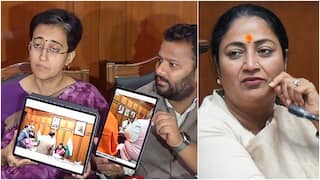'When The Subaltern Finally Spoke...': Viral Video Of Gayatri Spivak's Lecture At JNU Sparks Online Debate
A recent lecture by literary critic Gayatri Chakravorty Spivak at JNU sparked a controversy after a video surfaced of a tense verbal spat between her with an audience member over pronunciation.

A lecture at Jawaharlal Nehru University (JNU) by literary critic Gayatri Chakravorty Spivak recently veered into unexpected territory, sparking a fiery debate that reverberated far beyond the confines of the lecture hall. What began as an academic discourse gradually transformed into a verbal clash, ignited by a correction over pronunciation.
Ashok Kumar, self-identified as a Founding Professor and Chairperson of the Centre for Brahmin Studies, posted a video of the incident on his X handle, stirring the debate online.
During the lecture, while attempting to pose a question, Kumar faced interruptions from Spivak, who corrected his pronunciation of WEB Du Bois, a notable Black civil rights activist.
"Du Bois (pronounced Do Boys). Will you please learn his name? If you're going to talk about the man who is perhaps the best historian and sociologist of the last century and this is supposed to be an elite university, then please take the trouble to learn how to pronounce his name," Spivak remarked.
Additionally, she clarified, "He is an Englishman, not French".
Kumar's response, "If you're done with the trivialities...", prompted Spivak to reprimand him for his perceived rudeness towards an elderly woman. The moderator intervened, urging Kumar to keep his questions concise.
Upon resuming his query, Kumar again mispronounced Du Bois, leading to another correction from Spivak. His subsequent reaction led to Spivak ignoring his question, and the moderator moved on to other attendees.
Taking the matter to X, Kumar commented on Spivak's claims of middle-class status and referenced her lineage, including connections to figures like social reformer Ishwar Chandra Vidyasagar. He highlighted the "irony" of the situation by citing Spivak's renowned work, 'Can the Subaltern Speak', which critiques the silencing of the maginalised voices.
When I stood up to raise my questions after Gayatri Chakraborty Spivak was done with her Lecture on WEB Du Bois and Democracy, This Bastard and Bitch Lady had the audacity to interrupt me thrice on my pronunciation of Du Bois. Can the Subaltern Speak? pic.twitter.com/VkZI0eLewy
— Anshul Kumar (@notsomeritorios) May 21, 2024
Verbal Spat At JNU Lecture Hall Reverberates On X
Kumar's X post ignited a heated online discussion. Some users condemned Spivak's conduct as arrogant and unnecessarily humiliating, with writer Meena Kandasamy sharing a similar negative encounter with Spivak, advocating for a more graceful approach to pronunciation correction.
"Bullying someone over their pronunciation is just not done," tweeted Kandasmay. "You slip in the right pronunciation, gracefully, when you repeat the same thing, move on, and focus on the content of what is being said. That's what a committed, dedicated teacher does... To snub someone over their pronunciation, in a hall filled to the brim with people, shows insecurity, pettiness, and the unwillingness to be magnanimous," she added.
Conversely, some users defended Sivak's actions, asserting that Kumar warranted correction and praising Spivak for upholding standard of proper pronunciation.
"She was absolutely right to school you," stated one user. However, another user remarked: "When the subaltern finally spoke she rattled".
Gayatri Charavorty Spivak, aged 82, is a highly influential scholar known for her multifaceted contributions to literary theory and feminism. As a university professor at Columbia University and a founding member of the Institute for Comparative Literature and Society. Spivak is known for the nature of her work which challenges patriarchal structures, explores women's experiences in colonial and postcolonial contexts, and advocates for the amplification of marginalised voices. Notable among her works are 'Can the Subaltern Speak?' and 'In Other Worlds: Essays in Cultural Politics'.
Trending News
Top Headlines












































